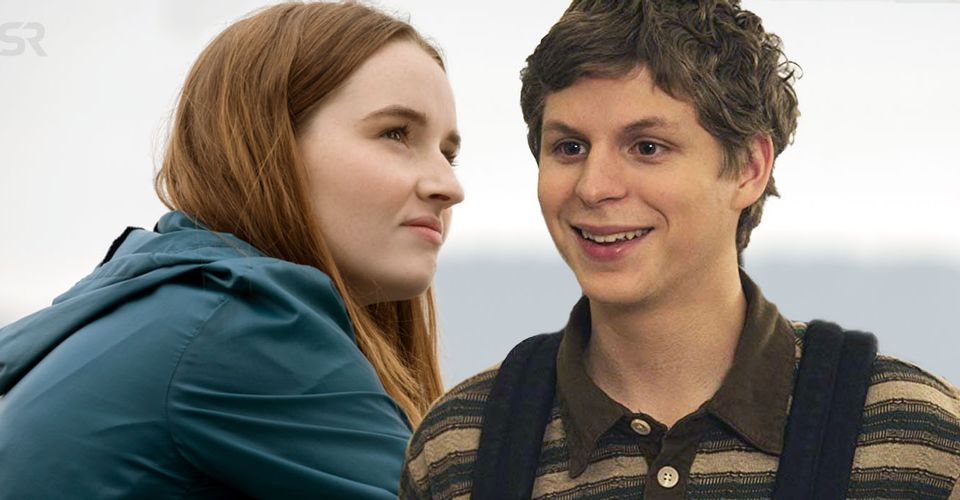Booksmart vs. Superbad: How Similar Are They & Which is Better?

Warning: SPOILERS ahead for Booksmart
Olivia Wilde’s directorial debut Booksmart has basically the same plot as Greg Mottola’s 2007 movie Superbad – but it’s also different enough that the two movies compliment one another instead of one being the definitive version. Booksmart stars Beanie Feldstein (younger sister of Superbad‘s Jonah Hill) as Molly, an over-achieving school class president getting ready to head off to Yale, and Kaitlyn Dever as Amy, a similarly hard-working introvert who came out as a lesbian for two years, but can’t muster up the courage to ask out her crush, Ryan (Victoria Ruesga).
On the day before graduation, Molly learns to her horror that everyone in their class managed to get into a good college while also partying their way through high school. Determined that she and Amy aren’t going to graduate without having partied, Molly plans one wild night out at a party being thrown by their classmate, Nick (Mason Gooding). There’s just one problem: they forgot to get the address of the party.
Both Booksmart and Superbad come from a grand tradition of teen coming-of-age movies like Can’t Hardly Wait and American Pie, in which kids who are on the verge of becoming adults have to face the prospect of moving on to college and leaving the status quo behind – friends included. Booksmart has drawn a lot of comparisons to Superbad, and its easy to see why. But how similar are the two movies, and which one is better?
Booksmart Basically Has the Same Plot as Superbad

Booksmart’s Molly and Amy have a similar dynamic to Superbad’s Seth (Jonah Hill) and Evan (Michael Cera), in that one is bold and outspoken, whereas the other is quieter and often finds themselves being led around. Also, as in Superbad, the two characters are heading in different directions after they graduate: Molly to Yale, and Amy to Columbia after a summer spent helping women make tampons in Botswana. And just as Evan keeps a secret from Seth so as not to hurt his feelings (that he’ll be rooming with Fogel at college), Amy is keeping a secret from Molly – ultimately revealing during an argument that she’s going to Africa for a whole year, not just for the summer.
This core character dynamic is the heart of both movies, with the characters’ unspoken resentment towards one another getting mixed up with the genuine angst they’re feeling (but not really expressing) about saying goodbye to their best friend. For Seth and Evan, this explodes into an argument where Seth accuses Evan of “bailing” on him by going to Dartmouth, and Evan accuses Seth of holding him back. For Molly and Amy the fight happens at a party, with Molly accusing Amy of never making any big decisions and having to always be dragged along, and Amy dropping the bombshell that she’s taking a gap year, throwing their college timelines off so they won’t graduate at the same time.
In both Booksmart and Superbad there’s a party to get to, and a complication in getting to that party. For Molly and Amy, it’s the fact that they don’t actually know where the party is. For Seth and Evan, it’s the fact that they’ve agreed to score booze for Jules’ (Emma Stone) party, and can’t show up empty-handed. It’s through this obstacle that the hijinks occur – whether it’s poor Fogel getting punched during a liquor store robbery, or Molly and Amy attempting to muscle information from a shady pizza delivery guy. In both movies the main characters end up going to the wrong party at first, taking them down a path of ridiculous encounters, until they finally reach their goal and briefly enjoy a euphoric party experience… until it all goes wrong.
The main characters’ fight is ultimately resolved, both in Booksmart and Superbad, by one rescuing the other after the cops raid the party they’re at. An extremely drunk Seth carries Evan away to safety, while Molly shows up the next day to get Amy out of jail so that she can make it to graduation. The two sets of best friends apologize to one another (Seth and Evan while they’re huddled on the floor in sleeping bags, Amy and Molly through the glass at the local jail), and make peace with the fact that they’ll soon be parting ways.
Superbad and Booksmart Are Great in Different Ways

Though Booksmart may have the same basic plot structure as Superbad, it’s a long way from being a rip-off and both movies are great in their own way. For starters, Booksmart arrived in theaters more than a decade after Superbad, and as such its teen landscape has a very different feel to it. Whereas Superbad is a classic teen slacker comedy, Booksmart is an anti-slacker movie, whose protagonists are high achievers who already have a ten-year plan for their careers (or at least Molly does). It also subverts the traditions of teen movie high schools being filled with either jocks and burnouts or kids who are destined for great colleges, by revealing that characters like Nick and “Triple A” (Molly Gordon) can both party and get good grades.
The fact that Booksmart‘s protagonists are girls also affects the way they interact. Though there’s some good-natured teasing between them, like Molly demanding to know which of Amy’s stuffed toys is more than just a friend, it doesn’t take a night of partying and a lot of alcohol for them to be able to say “I love you” to each other. Molly and Amy start their night out by dressing up in matching outfits and gushing about how beautiful they look – something that they repeat later after an outfit change. And given that so many teen movies with female protagonists tend to revolve around a makeover plot or focus on romance, it’s actually refreshing to have a teen movie that’s about girls just trying to party and have fun.
All this is to say that while Superbad and Booksmart might share a formula, neither one of them is redundant and Booksmart is not a “rip-off” of Superbad. After all, Superbad itself borrowed elements from teen movies that had gone before it, but put its own spin on them and succeeded in standing out. Booksmart too adds its own twists, like the hilarious enigmatic rich girl Gigi (Billie Lourd) who crosses paths with Molly and Amy over and over again on their wild night out, or a surreal stop-motion sequence where Molly and Amy transform into dolls after eating some spikes strawberries.
Why Booksmart’s Ending is Better Than Superbad’s

One other major difference between Booksmart and Superbad is how they end – specifically with respect to whether the protagonists “get the girl” (or in Molly’s case, boy). Seth and Evan both fumble their chance at getting with their crushes at Jules’ party, but end up meeting up with them at the mall the next day and going their separate ways. There’s some poignancy in the moment, but Superbad‘s ending is probably the least memorable part of the movie, and leaves much of the heavy lifting for Seth and Evan’s relationship to their late-night confession in the previous scene.
By contrast, neither Amy nor Molly end up getting together with their crushes, despite promising signs at the party. Nick flirts with Molly but then leaves her to go out to the pool, where he makes out with Ryan – much to Amy’s horror and disappointment. This kicks off the fight between Molly and Amy and ultimately pushes Amy to prove that she’s not a “coward” – first by having a disastrous sexual encounter with Hope (Diana Silvers) in the bathroom, and then by saving the rest of the partygoers from the cops by creating a diversion.
There’s also a powerful scene towards the end of Booksmart where Molly is offered a ride home by her nemesis, a popular and pretty girl who has been given the degrading nickname “Triple A” because of stories about her offering “roadside assistance” to guys (as Amy points out earlier in the movie, none of the guys that Triple A got together with were given degrading nicknames). The two of them butt heads at the start of the movie, with Molly sneering at Triple A for being a loser who peaked in high school and will fail in life, before learning to her horror that Triple A is also going to Yale. On the ride home, Triple A admits that the worst part of being given her nickname was the fact that girls used it as well of the boys – a sobering moment for Molly, who has posters and car stickers declaring herself to be a proud feminist, but still has a lot to learn about what that means in practise.

Booksmart‘s real climax isn’t at the party, but the morning after, when Molly and Amy go on a wild joy ride in Jared’s (Skyler Gisondo) car and show up to graduation as heroes. The graduation scene is an inversion of the usual “nerd revenge” movie formula. Instead of Molly and Amy getting their own back on the supposed bullies, Molly realizes that she’s been something of a bully herself; people don’t dislike her because she’s smart, but because she looks down on them. She reconciles with her classmates, they cheer for her, and its a great feel-good way to wrap the movie up. When Amy later decides to show up late to her flight so that she and Molly can go and get pancakes
Ultimately it’s hard to say, overall, which is the better movie between Booksmart and Superbad. They may follow the same formula, but they’re about different genders, different generations, and ultimately have very different styles. Booksmart digs a little deeper, but Superbad skilfully conveys a heartfelt story about male friendship within the Trojan horse of a raunchy teen comedy. Booksmart isn’t a copy of Superbad – they’re just two halves of an excellent double-bill.
About The Author

















